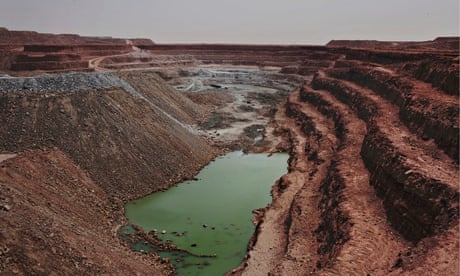Another deadline has passed without agreement in Niger in the government's ongoing negotiations with the French nuclear company Areva on the renewal of the company's license to operate in the country.
After months of discussions, the mining minister, Omar Tchiana, said last week that Friday would be the final deadline for the two sides to strike a deal. Now it has been agreed that talks will continue without a fixed deadline.
The negotiations are deadlocked on the issue of the royalties Areva pays Niger for the rights to two large uranium mines, Somair and Cominak in the arid north of the country. The terms of the original deal struck in the early 1970s have never been made public, but government sources say the company pays about 5.5% of its revenues in royalties. Niger wants the terms of a new mining code passed in 2006 to be implemented, which would force Areva to pay between 12% and 15% in royalties, and end a number of tax breaks on materials and equipment.
"Niger has not benefited at all from uranium production for 40 years. These contracts need to be win-win for Niger and not just for the benefit of France and Areva" said Ali Idrissa, the executive co-ordinator of the civil society group Rotab.
The issue is of huge significance to the country, which ranks bottom of the UN's human development index.
According to Oxfam, Areva's annual turnover of €9bn ($12.4bn) is more than four times Niger's entire annual budget of €2bn.
What is striking is the extent to which Nigeriens have begun to engage on the issue of fair deals in extractive industries. Since November there has been a constant stream of protest marches on the streets of Agadez and Niamey, although the numbers have generally been small. Many people are now able to speak with confidence and knowledge about the terms of Areva's deal.
"In the beginning, not many people went out on our demonstrations, but as the issue has continued, more and more people are joining us. If you look at local media you will see lots of debate on the subject. We will continue to go into communities and villages to educate" said Solli Ramatou, the co-ordinator of the Research Group on Extractives in Niger.
Like many other African nations abundant in natural resources, Niger faces a serious challenge in making extraction work in the interests of its population. The country became an oil producer in late 2012 through a production facility and refinery in the east of the country majority-owned by the Chinese National Petroleum Company. Output is currently a meagre 20,000 barrels a day, but the government clearly hopes to position itself as an important west African exporter.
"We're realising the importance of getting the right contracts in our extractive industries" said Mahaman Laouan Gaya, the secretary general of the mining ministry. "The uranium issue is helping us to achieve transparency and everyone is watching us to see what the outcome is."
The country's constitution, passed in 2010 and which paved the way for the restoration of democracy under President Mahamadou Issoufou, establishes important guarantees on transparency. Article 150 states that contracts with extractive companies must be published and calls for the establishment of a future generations fund (FGF), provisions praised by the transparency watchdog the Revenue Watch Institute. Niger was declared compliant with the Extractive Industries Transparency Initiative (Eiti) in 2011. The constitution also stipulates that money from extractive industries should be used to promote development that prioritises sectors such as health and education.
Despite such guarantees, the current negotiations between Areva and the government are still less than transparent, and steps towards establishing a FGF and prioritising its spending have not been implemented.
Resource extraction industries are unlikely to make a serious dent in poverty indicators in the foreseeable future, given that Niger's oil, gold and uranium production taken together only represent about 5% of the country's GDP. Agriculture and foreign assistance make up the rest.
It is likely that Niger will be able to leverage a better deal from Areva, despite the company's claims that a higher royalty rate could make the operation prohibitively unprofitable. Areva has been investing heavily in a new uranium mine at Imouraren. The project has been repeatedly delayed, mainly because of security concerns, but it is expected to open in late 2015. Assuming it does, it will be the second-biggest uranium mine in the world, making Niger's the world's second producer of the element after Kazakhstan. It's unlikely that the company will want to walk away from that.

Comments (…)
Sign in or create your Guardian account to join the discussion